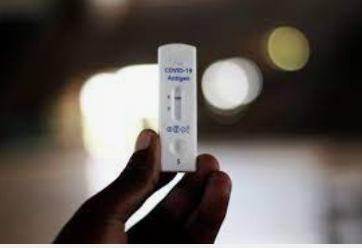The Washington Post
Februry 18, 2022
It’s one of the enduring mysteries of covid-19: Why didn’t the pandemic hit low-income African nations as hard as wealthy countries in North America and Europe?
There is no simple answer to that question. But this week, two new studies added to our understanding of it. One suggested that the number of covid-19 cases may be vastly undercounted across the continent; another found good evidence that the number of deaths in at least one country could be significantly undercounted.
Neither study necessarily changes our current big picture understanding of the pandemic — that wealthy countries often saw worse outcomes than developing nations.
However, they could have a big impact on the debate about how and why African nations were forgotten by wealthy nations during the pandemic — especially as the European Union and the African Union meet in a joint summit in Brussels and the World Health Organization pushes for wealthy nations to back a South African facility that aims to share mRNA technology.
“In Africa, 83 percent of people still have not received a single dose,” WHO Director General Tedros Adhanom Ghebreyesus said Tuesday at a Vaccine Equity for Africa event in Germany.
“This is not only a moral failure, it is also an epidemiological failure, which is creating the ideal conditions for new variants to emerge.”
The coronavirus ravaged almost all corners of the earth, including wealthy nations like the United States and Britain. In Africa, things went differently. The continent “appears to have bucked the doomsday predictions of global health experts,” my colleagues wrote in December 2020.
Even after the fast-spreading omicron variant, first identified in southern Africa late last year, that trend has largely held up. One-fifth of the world’s population lives in Africa, but the continent has accounted for only a tiny sliver of confirmed cases around the world.
According to Our World in Data, as of mid-February, 2.7 percent of all confirmed covid-19 cases were found on the continent. By comparison, North America saw 22 percent of all global cases; Europe more than a third.
But reliable public tracking of new daily covid-19 cases rests on something important: easy access to coronavirus tests and the expensive infrastructure to administer and track their results. Throughout the pandemic, many African nations had neither.
But reliable public tracking of new daily covid-19 cases rests on something important: easy access to coronavirus tests and the expensive infrastructure to administer and track their results. Throughout the pandemic, many African nations had neither.

A man holds a coronavirus testing kit at a private health facility in Harare, Zimbabwe. (Tsvangirayi Mukwazhi/AP)
In a preprint study released this week, a team of researchers with WHO backing tried to tackle that problem by looking at available data about people with covid-19 antibodies across the continent. These studies, known as seroprevalence surveys, use bloodwork to show who has some level of immunity to the coronavirus — whether through vaccinations or a previous infection.
The study found that levels of immunity in Africa appeared to be vastly higher than could be explained by official case numbers, even when combined with the continent’s paltry vaccination levels. Every nation surveyed had far higher levels of immunity than official figures showed; Nigeria had a ratio of 958 to 1.
By September 2021, over 65 percent of the continent had some form of immunity to covid-19, the study estimated. This, the authors write, suggests there had not been 8.2 million cases across the continent by that time — but 800 million.
If this was accurate, did no one notice? One possibility, raised by the WHO-backed study, is that many of the cases in Africa may have been asymptomatic — perhaps more than two-thirds. Compared with Europe and North America, most African countries have relatively young populations that are less likely to see serious illness from the coronavirus.
The comparatively low number of deaths recorded from covid-19 across the continent seems to support this idea. Just 4 percent of deaths globally were recorded in Africa, according to Our World in Data.
There are many signs that not all deaths from covid-19 are caught in official figures. Even in the United States, the number of “excess deaths” recorded by the Centers for Disease Control and Prevention that are not directly attributed to covid-19 is roughly 100,000.
Most African nations do not collect the data needed to estimate excess mortality.
But a small and innovative study released by the World Bank this week used an unusual method to estimate pandemic deaths in Kenya: a popular obituary website.
By looking back at several years on the website -which was used because better data did not exist — the researchers were able to see how past trends compared to the pandemic years.
Their conclusion was that since the start of the pandemic, there have been roughly 28,000 “excess deaths” during the pandemic period, compared with just 5,520 recorded in official government figures.
Neither study provides anything like a full accounting of covid-19 in Africa. Instead, they add to a better understanding of the many gaps in knowledge about covid-19 that remain two years into the pandemic.
If we take the idea that both cases and deaths in Africa were significantly undercounted, it has some surprising knock-on impacts. In some cases, it may mean that demand for coronavirus vaccines across Africa could be lower.
A number of groups, including the WHO’s Africa branch, have already suggested that the worst is over for the continent.
Any plan for manufacturing on the continent will have to deal with this factor, as a recent analysis by the Center for Global Development argued.
More broadly, it refutes the idea that covid-19 was simply a disease for rich countries. As other studies have shown, there was a range of experiences among wealthy nations. And when excess deaths are evaluated on a global scale, the vast majority of them may have been in the developing world.
Africa wasn’t miraculously spared from the pandemic, and there’s little reason to think it could not be hit far harder next time.
Originally published at https://www.washingtonpost.com on February 18, 2022.












